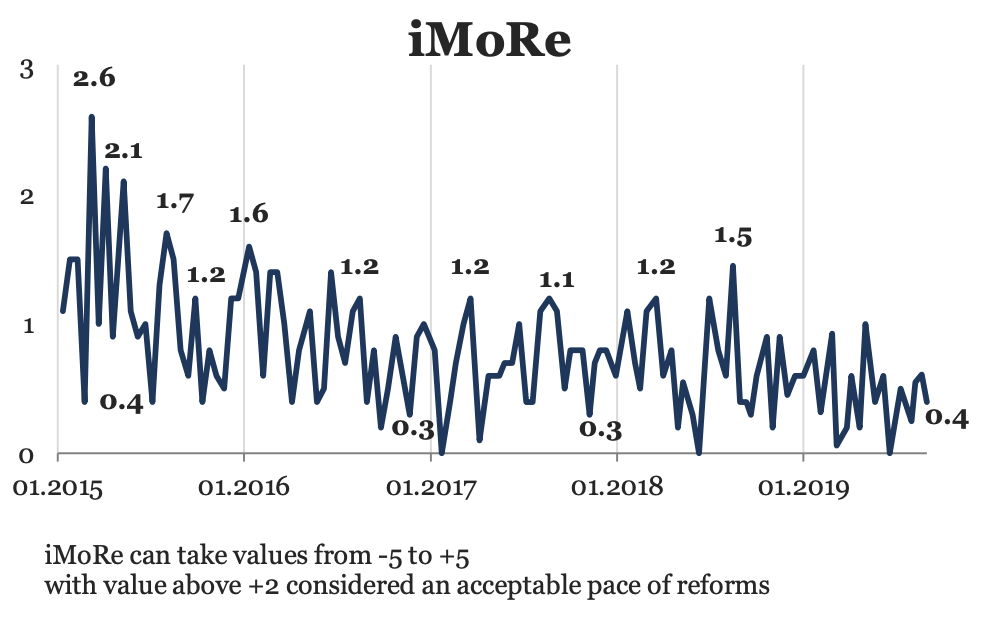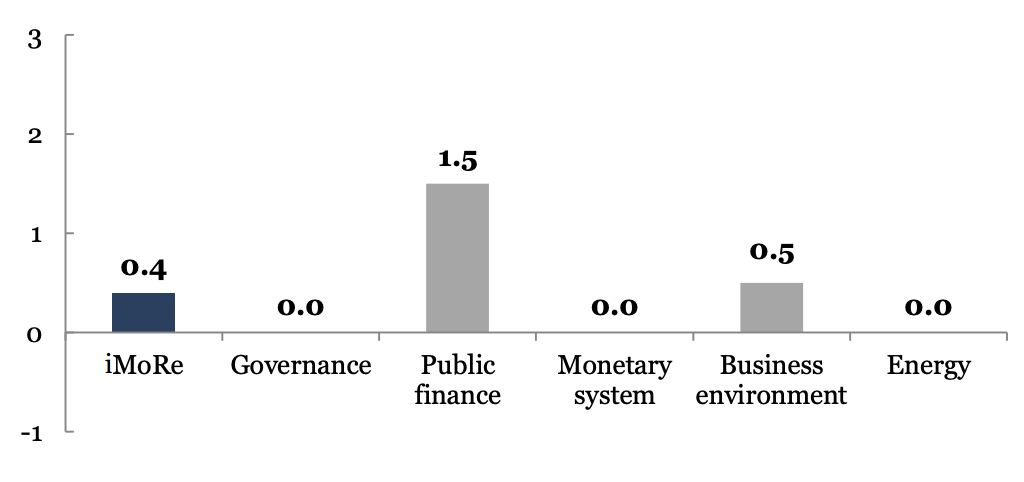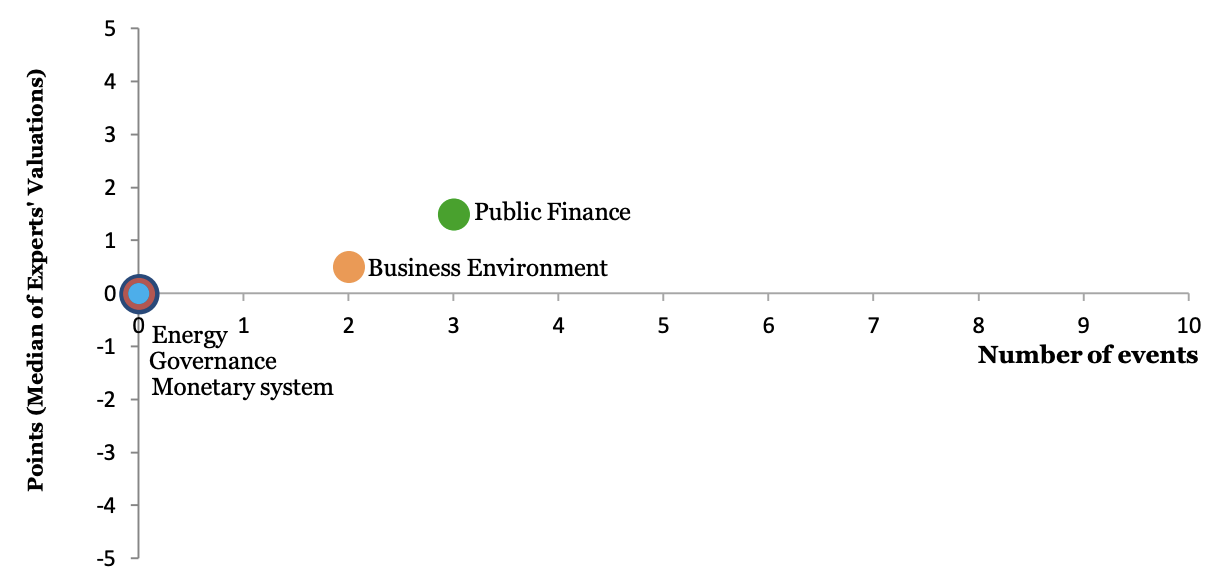Reform Index was +0.4 points for the period from August 12 to September 1, 2019, on a scale of -5.0 to +5.0. In the previous round, the index was +0.6 points.
The events of this round are the approval of new standards of emergency medical care, the introduction of the principle of “money follows the teacher” and a new order of land monitoring. The introduction of new supervisory procedures in the field of remuneration has received negative evaluations from Reform Index experts.
Chart 1. Reform Index Dynamics

Chart 2. Reform Index and its components in the current round

The events of this round:
Approval of new standards of emergency medical care, +2.0 points
Emergency medical care is ineffective today. In particular, in 2016, only 8.5% of resuscitations by teams of ambulances performed on patients with cardiac arrest were successful and let to resumed spontaneous blood circulation. For comparison, the corresponding avarege number for Europe is 29%.
Emergency medicine reform implies new requirements for the ambulance team, the introduction of a modern dispatching system and the updating of the car fleet. It begins with the implementation of the pilot project and should be completed by 2025. The pilot project is being implemented since 2019 in Vinnitsa, Donetsk, Odesa, Poltava, Ternopil regions and in Kyiv. It is planned to expand it to all regions starting from 2020.
Cabinet of Ministers of Ukraine`s decree No. 764 of August 21, 2019 introduces new requirements for ambulance teams.
By 2025, the ambulances must be completed with teams of paramedics. Each such team will consist of at least one paramedic and one emergency medical technician. The head of the emergency medical care center may also include in a team doctors of emergency medical services, interns, trainees, students, etc.
The task of paramedics is to provide patient with the full amount of pre-hospital emergency medical care and to transport him/her to the hospital in a timely manner. Paramedics will be trained by medical universities. One needs a bachelor’s degree to work as a paramedic. Nurses and paramedics currently working in the ambulance teams will be able to undergo advanced training to become paramedics.
The task of the emergency medical technician is to assist the paramedics and the doctors of the ambulance team. Such specialists do not need higher medical education. Colleges will prepare them. By 2025, all ambulance’s drivers must receive this qualification. Thus, the ambulance driver will also help the team save the patient, not just wait for the doctors or paramedics “to do their thing”.
To implement these changes, a system of training and retraining of all team members has to be created. Future paramedics and emergency medical techniques will need to undergo external exam of theoretical knowledge and practical skills.
Implementing the principle of “money follows the teacher” to improve teachers skills, +2.0 points
In order to pass a qualification, teachers must have completed an advanced training at least once per 5 years. Such education was funded by state. Trainings took place in the state institutes of advanced training, which were founded in Soviet times. These courses were often uninteresting and unhelpful for teacher development.
In the Framework Law on Education (2017), MPs changed this approach and introduced the principle of “money follows the teacher”. It means that the teacher can choose the courses he wants to take, and the state will pay for it. However, there was no mechanism for the practical implementation of this principle.
Government decree No. 800 of August 21, 2019 creates these mechanisms. Now the teacher will be able to choose how and where he / she will study. The only importance is, that this method should be approved by the school’s pedagogical council. Teachers can take courses, take internships, attend workshops, seminars, etc. If a teacher’s council approves a training course for a particular teacher, the school signs an agreement with a body that organizes the course and pays for it. The total length of study should be at least 150 hours over 5 years.
The Ministry of Education will create a single portal where organizations offering training to teachers will post full information on their courses, trainings, seminars and more.
New Procedure for Inspections and Supervision of Observance of Labor Laws, -1.0 points
State Service of Ukraine on Labor performs inspections in accordance with Law 877-V of 05.04.2007. This activity is not effective. Many companies still do not have formal employment relationships with employees. According to the State Statistics Service of Ukraine, more than 3.5 million Ukrainians worked unofficially in 2018.
One reason for this is the fact, that State Service of Ukraine on Labor does not have sufficient tools and powers to oversee whether employers comply with labor laws.
At the same time, in 2004, Ukraine ratified the ILO Conventions on Inspections in Industry and Trade and in Agriculture. They stipulate that government officials may inspect businesses without warning in order to monitor compliance with labor laws.
However, current legislation allowed inspectors to visit businesses only after giving 10 days notice. During this time, the company could be prepared so that during the visit the inspector did not see any non-contracted workers at the enterprise. To address this, in April 2017 , the government introduced an opportunity to visit businesses without warning. However, in May 2019, the court overturned this decree because it found that the Cabinet of Ministers had adopted it in violation of the procedure.
The government recently adopted decree No. 823 of August 21, 2019, which again allowed labor inspectors to carry out inspection visits without notice.
In case of violations of the labor legislation, the inspector analyzes the materials of the inspection visit or of the “no visit” inspection. According to the results of the analysis, he orders and holds the perpetrator liable. If the order is fulfilled within the prescribed period, the measures for holding the object of the visit accountable are not taken.
New procedure for gathering information during the land monitoring and its transfer, +1.0 points
“The reason for the Cabinet resolution № 760 of August 21st 2019 is quite simple: in fact, the relevant amendments were introduced by the government two years ago by the resolution № 413 of July 7th 2017 No. 413 of June 7, 2017, but on June 25, 2019 the Constitutional Court of Ukraine found that by issuing it , the government went beyond its constitutional powers, because by a by-law it regulated the issue of right to get land ownership, which should be determined exclusively by the laws of Ukraine. Thus, the entire resolution, including amendments to other acts, was declared unconstitutional.
The new resolution of the Cabinet of Ministers of Ukraine “restored” the amendments in the government acts on land monitoring and the procedure of keeping the land cadaster, which were accidentally “lost” during the recognition of other norms as unconstitutional.
– Andriy Martyn, Senior Project Manager for Land Reform in the Reforms Delivery Office (RDO) of Cabinet of Ministers of Ukraine
Chart 3. Value of Reform Index components and number of events

Reform Index aims to provide a comprehensive assessment of reform efforts by Ukraine’s authorities. The Index is based on expert assessments of changes in the regulatory environment in five areas:
- Governance
- Public Finance
- Monetary system
- Business Environment
- Energy
For details please visit reforms.voxukraine.org
Attention
The author doesn`t work for, consult to, own shares in or receive funding from any company or organization that would benefit from this article, and have no relevant affiliations



